Receive ENBOTS Meeting Reports |
||
|
Receive our ENBOTS bulletins and reports by email: |
||

| Follow @enbclimate | ||

Loading... |
||
|
Receive emailed updates with the news articles above plus related information and announcements from our CLIMATE-L community mailing list: |
||
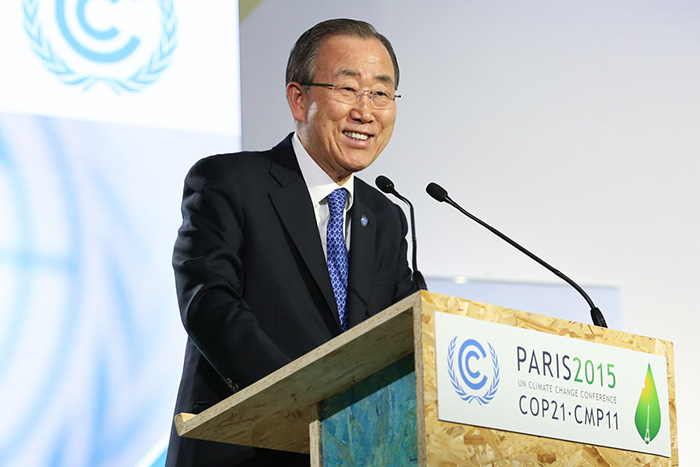 UN Secretary-General Ban Ki-moon at the Momentum for Change Lighthouse Activity Awards presentation ceremony.
UN Secretary-General Ban Ki-moon at the Momentum for Change Lighthouse Activity Awards presentation ceremony.The Immense Mitigation Potential of Green Buildings Presented by: Delta Electronics Foundation
Moderator Wim Chang, Deputy Executive Director, Delta Electronics Foundation (Delta), introduced the session on the architecture perspective of how green buildings can save energy, observing that each individual has a responsibility to conserve resources where possible.
Bruce Cheng, Founder and Honorary Chairman, Delta Group, outlined Delta’s work in promoting, designing and constructing green buildings. Observing the company’s status as a leading switching power supplier, he gave examples of several green building projects, such as the Tainan Plant in Taiwan, rated ‘EEWH Diamond,’ the highest level in Taiwan’s buildings certification standard, and highlighted that the electricity intensity in Delta’s own factories was reduced by 50% between 2009 and 2014.
Dinghuan Shi, President, China Renewable Energy Society (CRES), said that working collaboratively at all levels to reduce the energy consumption of buildings was key for addressing the challenges facing the survival of mankind. He underscored the need to promote the green buildings concept in different parts of the world, including in emerging markets.
Joshua Jih Pan, Fellow, American Institute of Architects, said the world must stop wasting resources and commit itself to a sustainable use of limited resources, underscoring the important role of architects in this endeavour. He outlined four projects undertaken in cooperation with Delta, including Delta Americas’ headquarters, certified “platinum” - the top rank of the US Green Building Council Leadership in Energy and Environmental Design (LEED) standards.
Ying-Chao Kuo, Founder, Bio-architecture Formosana, spoke on designing structures and projects with climate change in mind, underscoring the responsibility of all to improve the living conditions of future generations. He detailed the design of Namasia Minquan Elementary School, a green building built to respect indigenous culture through its design based on the shape of the local ‘datura’ flower, and intended to provide a warm environment for the schoolchildren to feel comfortable in.
Zhong Jishou, China National Engineering Research Center for Human Settlements, spoke on China’s rapid development, outlining the green building evaluation label in existence since 2008, but noting that more work needs to be done, as green buildings currently make up only a small percentage of total buildings.
Chung Laung Liu, Academia Sinica, spoke on the sense of inspiration brought about through the green buildings concept, hoping for its further long-term development so that most new buildings can be built green.
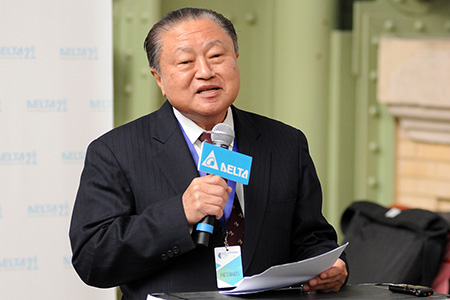 Bruce Cheng, Founder and Honorary Chair, Delta, underscored Delta’s objective of providing “clean, innovative, and energy-efficient solutions for a better tomorrow.”
Bruce Cheng, Founder and Honorary Chair, Delta, underscored Delta’s objective of providing “clean, innovative, and energy-efficient solutions for a better tomorrow.”
| 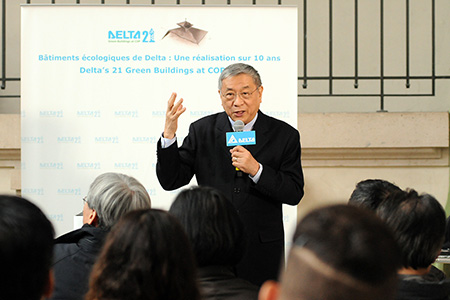 Joshua Jih Pan, Fellow, American Institute of Architects, presented the ‘Ring of Celestial Bliss,’ designed for the 2013 Taiwan Lantern Festival, made using recycled materials, and designed to represent sustainability and harmony with the natural environment.
Joshua Jih Pan, Fellow, American Institute of Architects, presented the ‘Ring of Celestial Bliss,’ designed for the 2013 Taiwan Lantern Festival, made using recycled materials, and designed to represent sustainability and harmony with the natural environment.
|
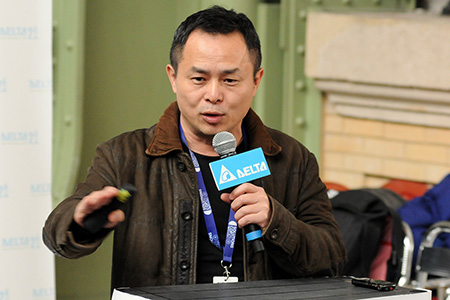 Ying-Chao Kuo, Founder, Bio-architecture Formosana, described the “fengsubility” approach, which combines the Chinese concept of feng shui, to attract prosperity, with sustainability.
Ying-Chao Kuo, Founder, Bio-architecture Formosana, described the “fengsubility” approach, which combines the Chinese concept of feng shui, to attract prosperity, with sustainability.
| 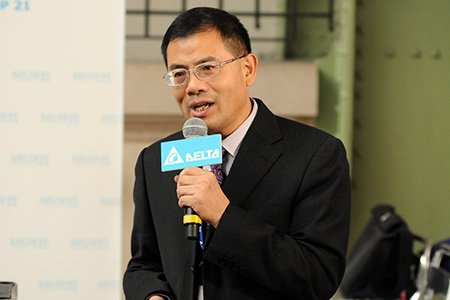 Zhong Jishou, China National Engineering Research Center for Human Settlements, explained that certain cities, including Jiangsu, Guangdong, Shandong, Shanghai and Hebei have received more green building certificates than others due to more favorable economic and weather conditions.
Zhong Jishou, China National Engineering Research Center for Human Settlements, explained that certain cities, including Jiangsu, Guangdong, Shandong, Shanghai and Hebei have received more green building certificates than others due to more favorable economic and weather conditions.
|
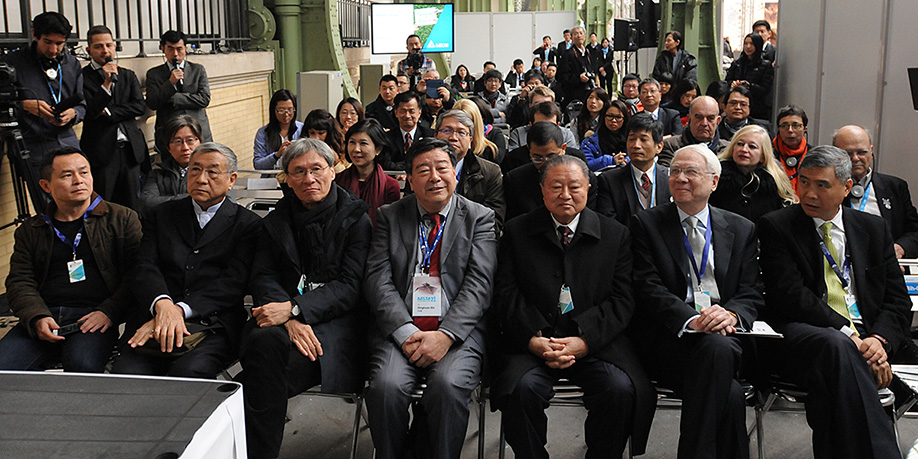
|

| 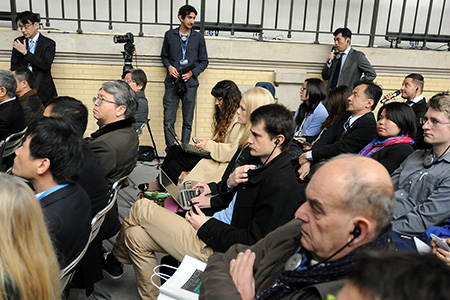
|

|
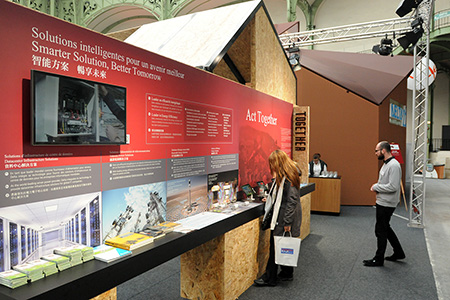
| 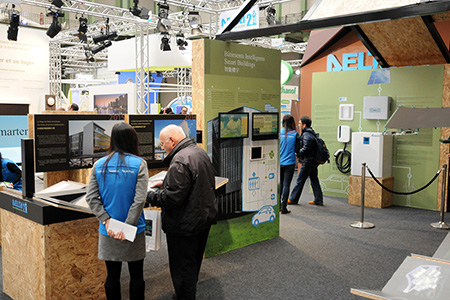
|
Contacts:
- Angela Yeh, Delta Electronics Foundation (Coordinator) | angela.yeh@delta-foundation.org.tw
More Information:
Energy Efficiency - The Local Authorities’ Visions Presented by: Delta Electronics Foundations, University of Leeds, and Climate Alliance
This event was moderated by Angela Yeh, Delta Electronics, and Karl-Ludwig Schibel, Climate Alliance. Schibel highlighted that the world is on an irreversible trajectory towards a decarbonized future, stressing that energy efficiency (EE) is an important part of addressing climate change. Yeh noted that EE is low hanging fruit to be reaped by national and local governments, and called for local governments, the private sector and other stakeholders to work together to ensure the implementation of energy efficient measures.
Maria Krautzberger, President, German Federal Environment Ministry, noted her government’s long-term perspective on EE and renewable energy, highlighting a goal to reduce energy consumption by 20% by 2020 and achieve carbon neutrality in the buildings stock by 2050. She drew attention to initiatives to incentivize the population towards greater EE, including an electricity savings cheque, the creation of EE networks to spread best practices among interested stakeholders from industry, and a competitive tender-based EE measure to promote efficient lighting.
Ping Cheng, CEO, Delta Electronics, shared the company’s history, announcing that since its inception 10 years ago, it has built 21 green buildings. He called attention to the Delta headquarters in California, US, describing it as a net zero energy building, and stressed that his company strives to improve energy conversion efficiency in all its technologies.
Shan-Shan Guo, Executive Director, Delta Electronics Foundations, made a presentation on corporate social responsibility (CSR) in green buildings and beyond, noting the high environmental awareness levels in Taiwan. She highlighted CSR activities sponsored by the Foundation, including the rebuilding of a school destroyed by a typhoon. She announced that the school is the first net zero school in the country.
Boris Palmer, Lord Mayor, Tübingen, Germany, and Climate Alliance Ambassador to COP 21, highlighted efforts in his city to improve EE. He highlighted, among others: the use of district energy for heating, work on retrofitting public buildings that has reduced CO2 emissions by 60%, and a campaign to phase out non-LED bulbs in households. He stressed the importance of citizens’ engagement for cities striving to be successful in implementing energy efficient measures.
Gianni Silvestrini, Kyoto Club, spoke about smart cities to improve EE and reduce emissions. He stressed that disruptive technologies can drive cities’ climate plans, highlighting the digital revolution in buildings as a means to increase EE. He noted the need for “deep building renovations” in older buildings, and further noted the importance of innovative finance and new approaches to retrofitting to cope with demand.
In the discussion, participants highlighted, inter alia, collaboration between local government and the private sector; the need for further investment for the reductions of CO2 emissions; the “hidden resistance” to green technologies in the reduction of emissions; and the place of smart grids in EE and renewable energy discussions.
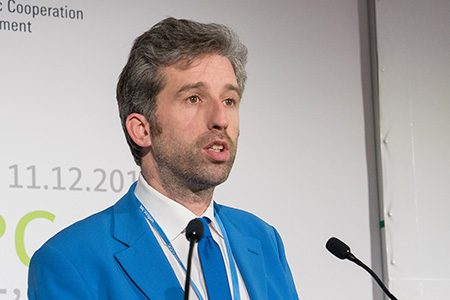 Boris Palmer, Lord Mayor, Tübingen, Germany, and Climate Alliance Ambassador to COP 21, announced that his city is aiming to reduce energy consumption by 25% by 2022.
Boris Palmer, Lord Mayor, Tübingen, Germany, and Climate Alliance Ambassador to COP 21, announced that his city is aiming to reduce energy consumption by 25% by 2022.
| 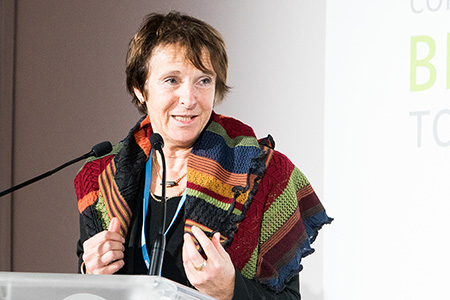 Maria Krautzberger, President, German Federal Environment Ministry, noted that implementing energy efficient measures may be economically challenging in the short run but presents new economic opportunities for the future.
Maria Krautzberger, President, German Federal Environment Ministry, noted that implementing energy efficient measures may be economically challenging in the short run but presents new economic opportunities for the future.
|
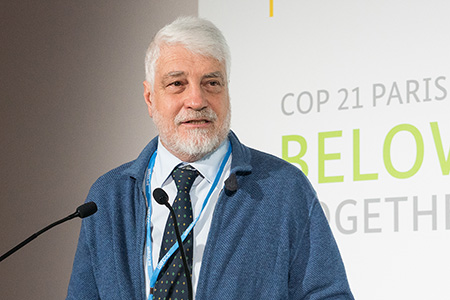 Commenting on the digital revolution in buildings, Gianni Silvestrini, Kyoto Club, highlighted smart thermostats that are creating savings of 10-15% in household heating and cooling costs.
Commenting on the digital revolution in buildings, Gianni Silvestrini, Kyoto Club, highlighted smart thermostats that are creating savings of 10-15% in household heating and cooling costs.
| 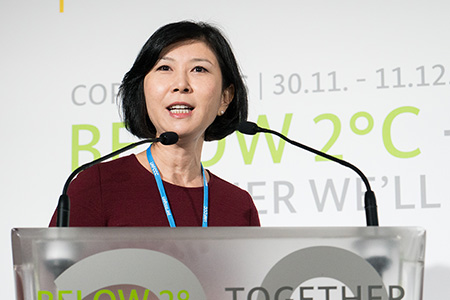 Shan-Shan Guo, Executive Director, Delta Electronics Foundations, drew attention to the Foundation’s exhibition dubbed ‘Delta 21 at COP 21,’ saying that it is a tool both for education and awareness raising.
Shan-Shan Guo, Executive Director, Delta Electronics Foundations, drew attention to the Foundation’s exhibition dubbed ‘Delta 21 at COP 21,’ saying that it is a tool both for education and awareness raising.
|
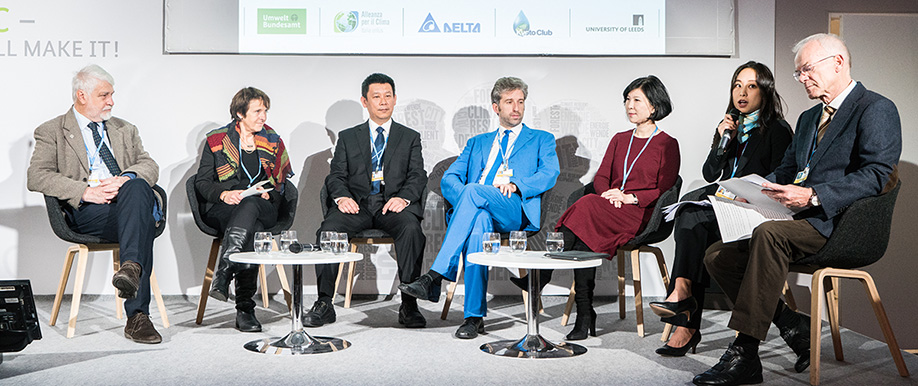 Panel (L-R):
Gianni Silvestrini, Kyoto Club; Maria Krautzberger, President, German Federal Environment Ministry; Ping Cheng, CEO, Delta Electronics; Boris Palmer, Lord Mayor, Tübingen, Germany, and Climate Alliance Ambassador to COP 21; Shan-Shan Guo, Executive Director, Delta Electronics Foundations; Angela Yeh, Delta Electronics; and Karl-Ludwig Schibel, Climate Alliance
Panel (L-R):
Gianni Silvestrini, Kyoto Club; Maria Krautzberger, President, German Federal Environment Ministry; Ping Cheng, CEO, Delta Electronics; Boris Palmer, Lord Mayor, Tübingen, Germany, and Climate Alliance Ambassador to COP 21; Shan-Shan Guo, Executive Director, Delta Electronics Foundations; Angela Yeh, Delta Electronics; and Karl-Ludwig Schibel, Climate Alliance
|
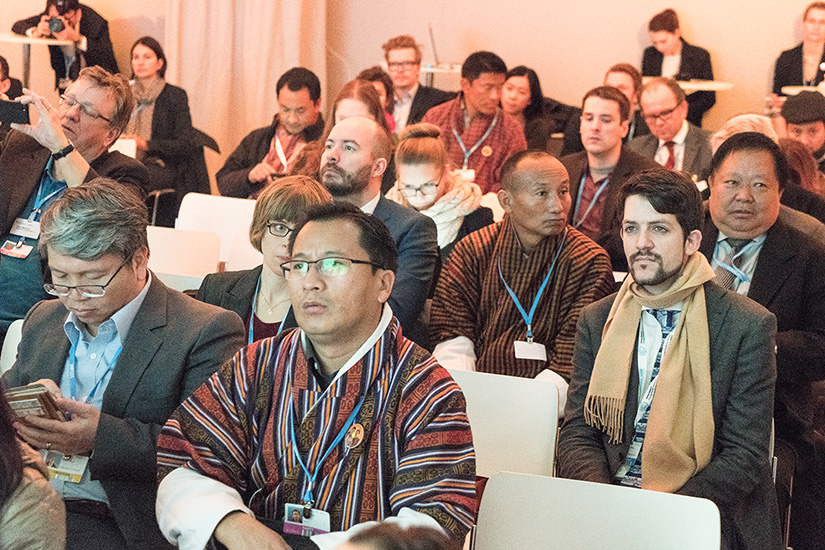
|
Contacts:
- Angela Yeh, Delta Electronics Foundation (Coordinator) | angela.yeh@delta-foundation.org.tw
More Information:
Technology Solutions for a 2°C World: Investing in Renewables,
Storage, Energy Efficiency and Carbon Capture and Storage Presented by:
Imperial College London; Danish Society of Engineers (IDA);
Global Carbon Capture and Storage Institute (Global CCS Institute); and The Carbon Trust
This side event, moderated by Martin Siegert, Grantham Institute, Imperial College London, addressed energy sector action as well as the necessary policies and investments for the deployment of clean technologies by 2030.
Siegert introduced the event, discussing solar energy, CCS, energy efficiency and innovation, and posing the question: do technological solutions exist or are new breakthrough technologies needed?
Philippe Benoit, International Energy Agency (IEA), highlighted the role of energy efficiency, renewables and CCS as key technologies for decarbonization. He noted that providing support for energy innovation depends on the maturity of the technology and the degree of market uptake, stressing the need for early support to improve competitiveness. On CCS, he drew attention to non-OECD countries, noting that over 95% of the projected growth in energy demand will take place in these countries.
Presenting results on energy modelling, Ajay Gambhir, Grantham Institute, Imperial College London, said that 2-9% decarbonization rate per annum will be necessary to achieve the 2°C goal, if action is taken by 2020. He noted that between 1973-1983, Sweden achieved the fastest known sustained annual rate of decarbonization at 4%. He also highlighted the Apollo project, which includes a significant increase in public research development and demonstration to decrease the cost of key technologies.
Beatriz Fernández Hernández, Future Climate - Engineering Solutions, stressed the role of engineers in providing scientific data on clean technologies, and in developing national plans and strategies for the implementation of the Intended Nationally Determined Contributions (INDCs).
Highlighting the role of chemical engineers in product transformation, Stefaan Simons, Institution of Chemical Engineers (IChemE), prioritized the importance of energy efficiency, energy storage and grid management, CCS, nuclear energy, and sustainable bioenergy. He stressed that while necessary technologies are available, collaboration and community engagement are essential to diffuse them.
John Scowcroft, Global CCS Institute, said that CCS technology is available, but a coherent policy framework and support are needed to ensure its deployment. He stressed that the need for CCS will be highlighted in future INDCs and called for policy parity, which includes: predictable and enduring policy arrangements; effective and cost efficient CCS law and regulation; incentivizing early storage site identification and characterization; re-doubling research and development to reduce costs and increase efficiency; and encouraging efficient development of hub and cluster arrangements.
Brian Vad Mathiesen, IDA, urged for rethinking the structure of the energy sector and considering it in an integrated manner. He said that a smart energy system design can create a robust and resilient system, which would contribute to job creation and generate considerably lower health-related costs. He highlighted that while conversion to 100% renewables is a technical option within economic reach, the manner in which the world moves towards his goal “is equally important.”
Considering global collaboration for cost-competitive clean energy, Tom Jennings, The Carbon Trust, said that partnerships: allow stakeholders to share costs associated with new technologies and lessons from demonstration projects; and create a market large enough to attract investments. Noting the existence of more committees and roadmaps than actual examples of action, he highlighted a framework of collaboration, which incorporates components for success, including commitment, direction, coordination, implementation and monitoring.
In the ensuing lengthy discussion, participants addressed inter alia: trade-offs on the implementation and deployment of new technologies; small-scale CCS applications; micro-grid related technologies; engagement of the scientific community with policy-makers; technology adaptation and adoption at the community level; efforts to deliver projects in a timely manner; and utilization of captured carbon.
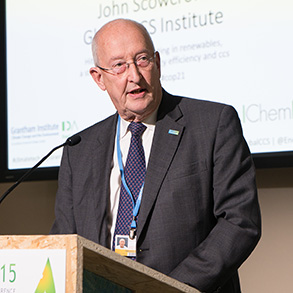 John Scowcroft, Global CCS Institute, highlighted the importance of CCS, and stressed that policies that spur investment are the missing pieces in the jigsaw puzzle.
John Scowcroft, Global CCS Institute, highlighted the importance of CCS, and stressed that policies that spur investment are the missing pieces in the jigsaw puzzle.
| 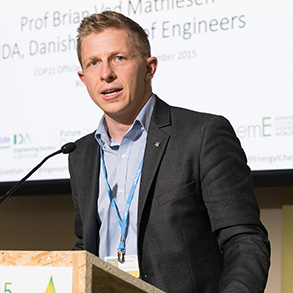 Brian Vad Mathiesen, IDA, urged for integrated energy systems, noting “silo thinking is too expensive.”
Brian Vad Mathiesen, IDA, urged for integrated energy systems, noting “silo thinking is too expensive.”
| 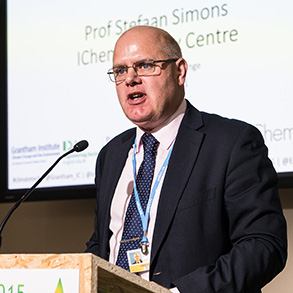 Highlighting the role of chemical engineers, Stefaan Simons, IChemE, said they “can convert words into action.”
Highlighting the role of chemical engineers, Stefaan Simons, IChemE, said they “can convert words into action.”
|
 Panel (L-R):
Philippe Benoit, IEA; Ajay Gambhir, Grantham Institute, Imperial College London; Beatriz Fernández Hernández, Future Climate - Engineering Solutions; Stefaan Simons, IChemE; John Scowcroft, Global CCS Institute; Brian Vad Mathiesen, IDA; and Tom Jennings, The Carbon Trust.
Panel (L-R):
Philippe Benoit, IEA; Ajay Gambhir, Grantham Institute, Imperial College London; Beatriz Fernández Hernández, Future Climate - Engineering Solutions; Stefaan Simons, IChemE; John Scowcroft, Global CCS Institute; Brian Vad Mathiesen, IDA; and Tom Jennings, The Carbon Trust.
|
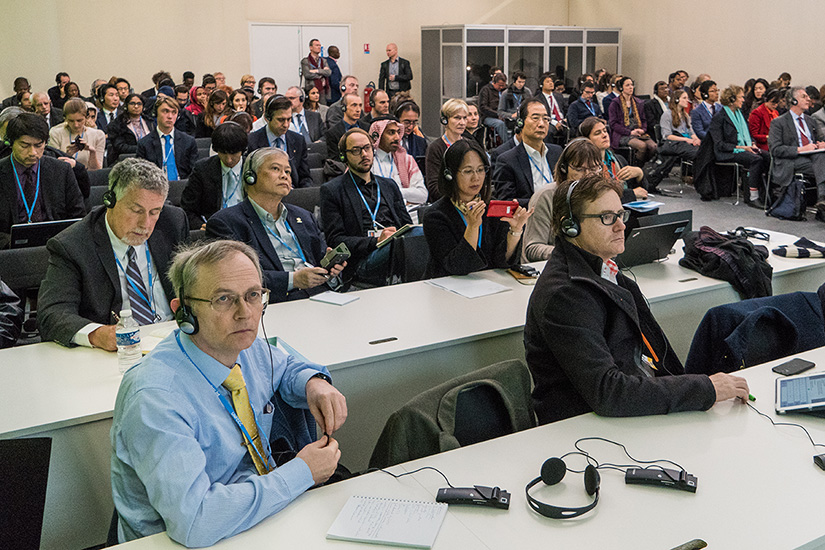
|
Contacts:
- M. Alyssa Gilbert (Coordinator) | a.gilbert@imperial.ac.uk
- Pernille Hagedorn-Rasmussen (Coordinator) | phr@ida.dk
- Mark Bonner (Coordinator) | mark.bonner@globalccsinstitute.com
- James Persad (Coordinator) | james.persad@carbontrust.com
More Information:
Climate Change and Biodiversity for Sustainable Development Presented by: Government of Mexico; Fundación Desarrollo Sustentable, A.C. (FDS); and Reforestamos Mexico (RM)
This side event, moderated by Ernesto Herrera Guerra, Director General, RM, addressed the interlinkages between biodiversity and climate change.
Guerra underscored that biodiversity plays an important role in climate change adaptation and mitigation efforts, noting that the impact of hurricane Patricia, which hit Mexico earlier this year, was mitigated in protected areas that were prepared for extreme climatic events.
Rafael Pacchiano Alamán, Minister of Environment and Natural Resources, Mexico, discussed impacts of climate change on biodiversity and actions for ecosystem preservation to mitigate the effects of climate change.
Francisco Barnés, Executive Director, Centro Mario Molina, provided an overview of natural disasters that have affected Mexico, stressing the country’s vulnerability to climate change. He highlighted, inter alia: strategic infrastructure; oil refineries in high-risk zones; floods and coastal erosion; water availability per hydrological region; finance; and integrated strategies for risk management to address climate change.
David Cooper, Deputy Executive Secretary, Convention on Biological Diversity (CBD), drew attention to the Strategic Plan for Biodiversity 2011-2020 and its 20 Aichi targets, noting that many of those targets are relevant to efforts to address climate change and are also reflected in the 2030 Agenda for Sustainable Development. He stressed that ecosystems could contribute as much as half of total emissions reductions required to achieve the 2°C goal, and underscored the need for the requisite policy frameworks, incentives and integration among different sectors.
Providing insights from the Philippines, Theresa Mundita Lim, Director, Department of Environment and Natural Resources, noted it ranks seventh in the list of countries most affected by extreme weather events worldwide. She emphasized that biodiversity is gradually emerging as part of practical, national solutions to adapt to and mitigate the impacts of climate change, reduce disaster risks, eradicate poverty, ensure food security and contribute to human well-being.
Commenting on his organization’s key work areas, Hilario Valenzuela, Executive Director, FDS, prioritized: climate change adaptation, mitigation and resilience; integration of value networks; and generation of social capital. Noting that more than half of the Mexican population lives below the poverty line, he highlighted, among others: actions of the Mayan people against genetically modified organisms in the Yucatan peninsula; efforts of forest people against poverty, using sustainable development solutions; and democratization of productive restoration solutions in Chiapas.
Rodolfo Lacy Tamayo, Ministry of Environment and Natural Resources, Mexico, underscored biodiversity as a cross-sectional element of the 2030 Agenda for Sustainable Development. Noting the need to preserve land, fresh water and marine ecosystems, and restore degraded ones, he stressed that local communities are most affected, highlighting the human rights elements in international environmental negotiations.
In the ensuing discussion, participants addressed, inter alia: the involvement of youth and local communities as active actors of ecosystem protection; Indigenous Peoples’ knowledge as part of the solution; and environmentally harmful activities of private companies in indigenous territories.
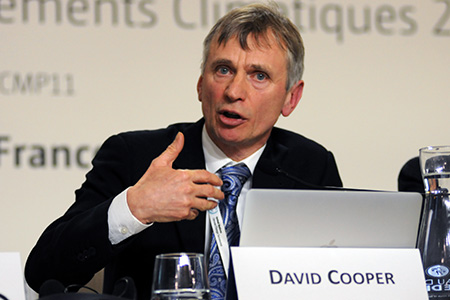 David Cooper, Deputy Executive Secretary, CBD, stressed that biodiversity is not only a victim of climate change but also a part of the solution.
David Cooper, Deputy Executive Secretary, CBD, stressed that biodiversity is not only a victim of climate change but also a part of the solution.
| 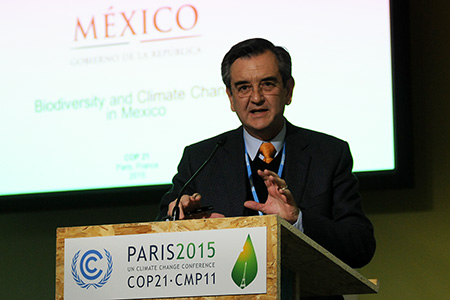 Rodolfo Lacy Tamayo, Ministry of Environment and Natural Resources, Mexico, reminded that "nature does not need us, we need nature."
Rodolfo Lacy Tamayo, Ministry of Environment and Natural Resources, Mexico, reminded that "nature does not need us, we need nature."
|
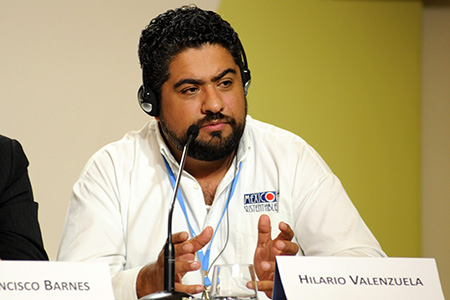 Hilario Valenzuela, Executive Director, FDS, stressed the role of civil society as actors of change in terms of sustainable development and climate change.
Hilario Valenzuela, Executive Director, FDS, stressed the role of civil society as actors of change in terms of sustainable development and climate change.
| 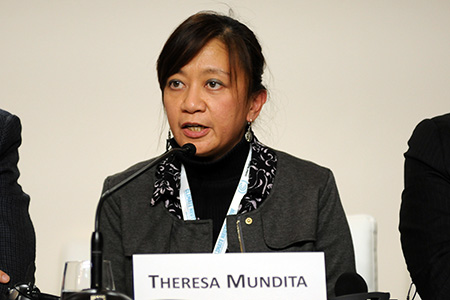 Theresa Mundita Lim, Director, Department of Environment and Natural Resources, the Philippines, drew parallels between Mexico and the Philippines regarding vulnerability to natural disasters and richness in biodiversity.
Theresa Mundita Lim, Director, Department of Environment and Natural Resources, the Philippines, drew parallels between Mexico and the Philippines regarding vulnerability to natural disasters and richness in biodiversity.
|
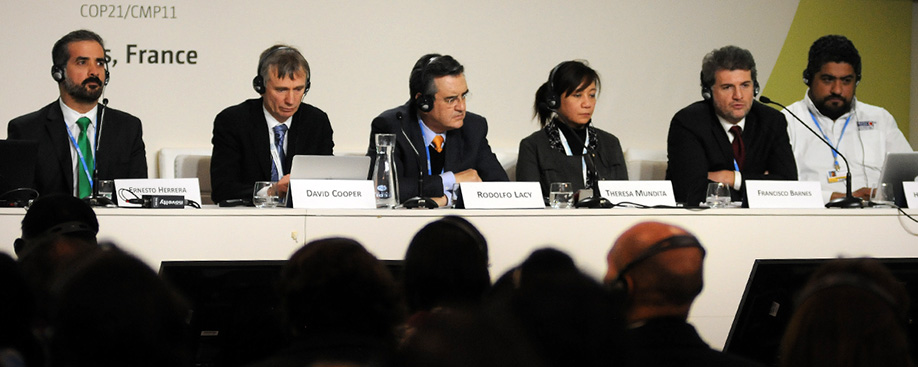 Panel (L-R):
Ernesto Herrera Guerra, Director General, RM; David Cooper, Deputy Executive Secretary, CBD; Rodolfo Lacy Tamayo, Ministry of Environment and Natural Resources, Mexico; Theresa Mundita Lim, Director, Department of Environment and Natural Resources, the Philippines; Francisco Barnés, Executive Director, Centro Mario Molina; and Hilario Valenzuela, Executive Director, FDS.
Panel (L-R):
Ernesto Herrera Guerra, Director General, RM; David Cooper, Deputy Executive Secretary, CBD; Rodolfo Lacy Tamayo, Ministry of Environment and Natural Resources, Mexico; Theresa Mundita Lim, Director, Department of Environment and Natural Resources, the Philippines; Francisco Barnés, Executive Director, Centro Mario Molina; and Hilario Valenzuela, Executive Director, FDS.
|
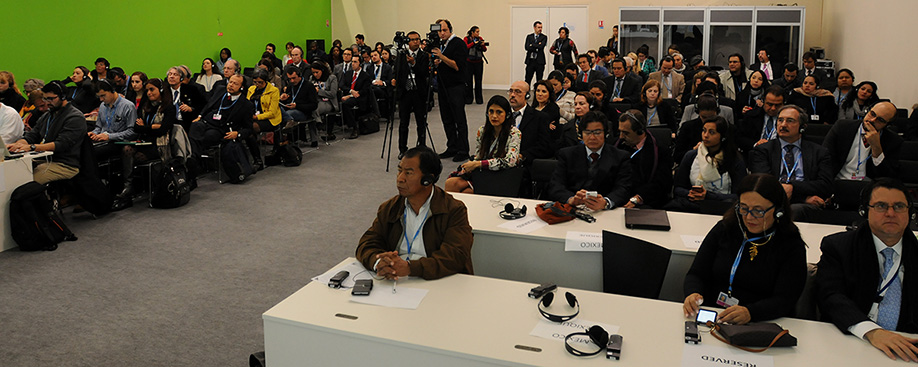
|
Contacts:
- Taryn Sanchez (Coordinator) | taryn@reforestamosmexico.org
- Jose Maria Valenzuela (Coordinator) | josemaria@fds.org.mx
- Neydi Cruz (Coordinator) | neydi.cruz@semarnat.gob.mx
More Information:
Learning from Good Practices of City to City Collaboration: Enhancing Sustainable City Development through the Joint Crediting Mechanism (JCM) City to City Collaboration Presented by: Institute for Global Environmental Strategies (IGES)
This event was introduced by Hironori Hamanaka, IGES, who explained the increasing recognition of the role of non-state actors in climate governance.
Gino van Begin, Secretary General, ICLEI, presented the Transformative Action Programme (TAP), a demand-driven and bottom-up tool to enable cities to present their climate action projects to potential investors, announcing that so far, more than 120 projects have started.
Haruka Miki-Imoto, IGES, presented insights from the collaboration between Yokohama and Da Nang, based on capacity building for handling environmental matters.
Ryuzo Sugimoto, Asian Development Bank (ADB), presented on the ADB support for urban development, highlighting public private partnerships and the work of the Japan Fund for JCM, which provides incentives for low-carbon technologies, both to sovereign and non-sovereign projects.
Kazuhisa Koakutsu, IGES, presented evidence from research on the increased recognition of cities under UNFCCC processes, highlighting the Lima-Paris Action Agenda and NAZCA. He noted that measuring, reporting and verification (MRV) remains the main outstanding question, and suggested strengthening the linkages between city action and the UNFCCC mechanisms and institutions.
Kentaro Tamura, IGES, reflected on references to non-state actors in the draft Paris agreement text, noting that many earlier references have been deleted.
Ensuing discussions concerned: institutional arrangements to enable direct access to finance by cities, including the Global Environmental Facility program on Sustainable Cities; the need for private and public finance to address climate action in cities; the role of cities at climate negotiations; integration of efforts at different levels of climate governance; and support from the ADB.
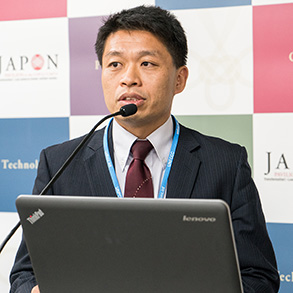 Ryuzo Sugimoto, ADB, presented on the ADB support to urban development.
Ryuzo Sugimoto, ADB, presented on the ADB support to urban development.
| 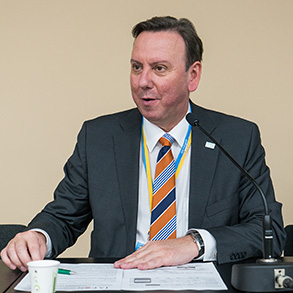 Gino van Begin, Secretary General, ICLEI, stressed that cities have gone beyond states in climate action.
Gino van Begin, Secretary General, ICLEI, stressed that cities have gone beyond states in climate action.
| 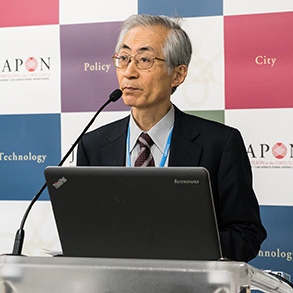 Hironori Hamanaka, IGES, introduced the event.
Hironori Hamanaka, IGES, introduced the event.
|
 Panel (L-R):
Hironori Hamanaka, IGES; Gino van Begin, Secretary General, ICLEI; Haruka Miki-Imoto, IGES; Ryuzo Sugimoto, ADB; and Kentaro Tamura, IGES.
Panel (L-R):
Hironori Hamanaka, IGES; Gino van Begin, Secretary General, ICLEI; Haruka Miki-Imoto, IGES; Ryuzo Sugimoto, ADB; and Kentaro Tamura, IGES.
|
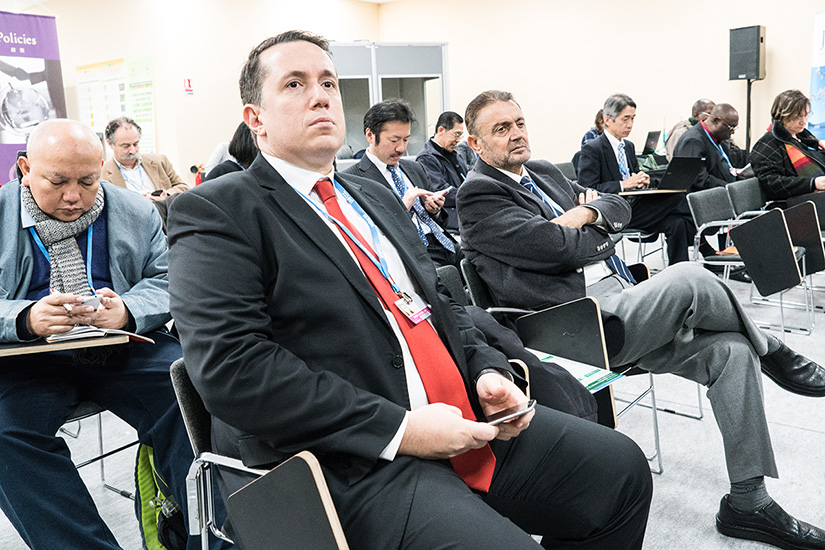
|
UNFCCC Momentum for Change Lighthouse Activity Awards Presented by: UNFCCC Momentum for Change
Nick Nuttall, Spokesperson, UNFCCC, welcomed participants to the ceremony to present the winners of the UN Momentum for Change Lighthouse Activity Awards.
Moderator Bertrand Piccard, President, Solar Impulse, and UN Environment Programme Goodwill Ambassador, spoke on the historical turning point taking place, in which solutions to global problems now exist and are profitable, meaning that it is possible to reconcile environmental protection and global economic development.
UN Secretary-General Ban Ki-moon lauded those working to adopt an ambitious, universal climate agreement, and applauded the innovators and entrepreneurs working to reduce climate change risk and develop projects that produce social and environmental benefits to build a sustainable future. He concluded that the closing ceremony of COP 21 would be the most important award ceremony, with the opportunity to “make us all winners” through a robust climate change agreement that, alongside the Sustainable Development Goals (SDGs), would lay a firm foundation for the peace, security, prosperity and dignity of all the world’s people and for the planet.
Teresa Ribera Rodriguez, Chair, Momentum for Change Advisory Panel, spoke on the history of the momentum for change initiative over the past five years. She underscored the change taking place, in which there are more and more innovative ideas to not only address solutions to climate change, but also for profitable projects that make social and economic sense.
Participants watched a video showcasing the ‘Urban Poor’ category, the winners of which were then presented with their awards: Solvatten Solar Safe Water Heater, Kenya; E-Waste: From Toxic to Green, India; and Emerging and Sustainable Cities Initiative, Latin America and the Caribbean.
Four winning projects from the ‘Women for Results’ category were then presented with their award: Self’s Solar Market Gardens, Benin; Fostering Cleaner Production, Colombia; Harvesting Geothermal Energy, El Salvador; and Planting Trees to Save the Mangrove, Guinea.
Three winners of the ‘Financing for Climate-Friendly Investment’ award were then presented: Microsoft Global Carbon Fee; Azuri PayGo Energy, Kenya; and Deforestation Free Cocoa, Peru.
Six award winners of the final category, ‘ICT Solutions’ were then invited to the stage to collect their awards: Mobilsol Smart Solar Homes, Rwanda and Tanzania; Chargepoint Electric Vehicle Charging Corridors, US; Lifelink Water Solutions, Kenya and Uganda; Enabling Farmers to Adapt to Climate Change, Uganda; Mapping Exposure to Sea Level Rise, Tonga, Samoa, Vanuatu and Papua New Guinea; and Fairphone, Netherlands.
M Sanjayan, Executive Vice-President, Conservation International, applauded the “inspiring individuals that are making a difference,” before presenting Conservation International’s video campaign intended to remind the world that people need nature, showing participants the world premiere of the film ‘Home.’
Participants then heard ‘Love Song to the Earth,’ a song to raise awareness about climate change featuring popular music artists, with a live appearance on stage from Sean Paul, Musician.
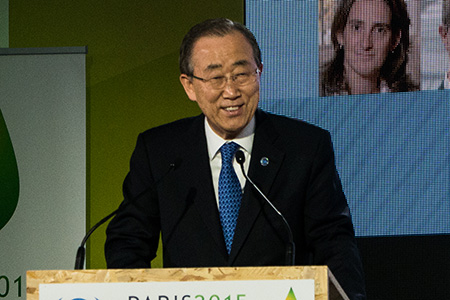 UN Secretary-General Ban Ki-moon announced that the UN planned to “walk the talk” by committing to being climate-neutral in all agencies around the world by 2020.
UN Secretary-General Ban Ki-moon announced that the UN planned to “walk the talk” by committing to being climate-neutral in all agencies around the world by 2020.
| 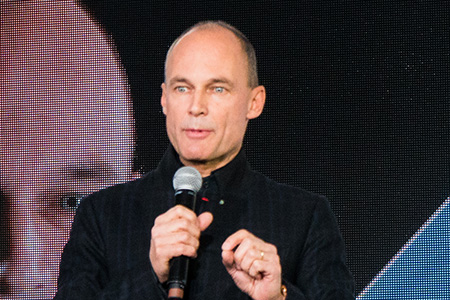 Moderator Bertrand Piccard, President, Solar Impulse, and UNEP Goodwill Ambassador, said while exploration in the last century was about discovering new territories, today, the challenge is to discover a better quality of life for everyone on earth.
Moderator Bertrand Piccard, President, Solar Impulse, and UNEP Goodwill Ambassador, said while exploration in the last century was about discovering new territories, today, the challenge is to discover a better quality of life for everyone on earth.
|
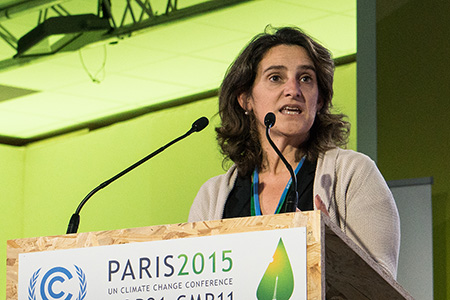 Teresa Ribera Rodriguez, Chair, Momentum for Change Advisory Panel, said the Momentum for Change initiatives were enabling people to face challenges through approaches rooted in development, fairness and inclusiveness.
Teresa Ribera Rodriguez, Chair, Momentum for Change Advisory Panel, said the Momentum for Change initiatives were enabling people to face challenges through approaches rooted in development, fairness and inclusiveness.
| 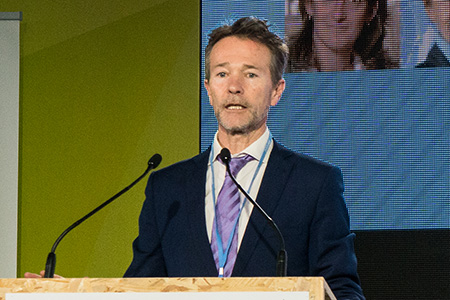 Nick Nuttall, Spokesperson, UNFCCC, presented awards to winners of the UN Momentum for Change Lighthouse Activity Awards.
Nick Nuttall, Spokesperson, UNFCCC, presented awards to winners of the UN Momentum for Change Lighthouse Activity Awards.
|
 Winners of the UN Momentum for Change Lighthouse Activity Awards in the category of ‘Urban Poor.’
Winners of the UN Momentum for Change Lighthouse Activity Awards in the category of ‘Urban Poor.’
|
Mobilizing Ambitious State and Non-State Climate Action in the Paris Agreement and Beyond Presented by: Wuppertal Institute for Climate, Environment and Energy
This event discussed design options for mitigation contributions in the Paris agreement and beyond, including opportunities and challenges for engaging non-state actors.
Hermann Ott, Wuppertal Institute for Climate, Environment and Energy, introduced the event, explaining that non-state actors are a diverse group including subnational governments, business and civil society.
Lukas Hermwille, Wuppertal Institute for Climate, Environment and Energy, presented a “structurational” lens to analyze climate agency, conceptualizing states as intermediaries, rather than ultimate decision-makers. He underscored the need for increasing ambition with the help of non-state actors, and the need for greater orchestration.
Reporting research on various groups of non-state actors, Björn-Ola Linnér, Linköping University, noted civil society provides a means for democratizing international climate governance, underscoring the need for greater accountability.
Philipp Pattberg, VU University Amsterdam, presented the results of a study on harnessing company climate action, explaining that there is limited evidence on the impact of climate action by companies.
Ann Gardiner, Ecofys, presented evidence from research on private sector initiatives based on five case studies, explaining, inter alia, that all could significantly scale up their impact, and adding that verification of action is a crucial issue.
Sebastian Gallehr, European Business Council for Sustainable Energy, stated their work shows that with adequate legal frameworks, business do deliver, as in the case of renewable energy, calling for courage in requesting and setting ambitious frameworks.
Ensuing discussions focused on, inter alia: regulatory frameworks as a hindrance, rather than as a facilitator, of business action; how the additional emission reduction potential of non-state actors is calculated; the need for increased transparency; the role of orchestrating institutions; and carbon pricing.
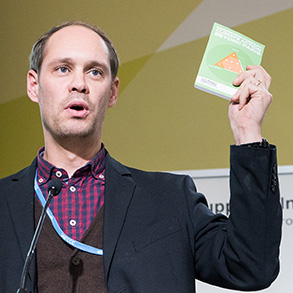 Philpp Pattberg, VU University Amsterdam, explained that climate action by companies has not yet reached its full potential.
Philpp Pattberg, VU University Amsterdam, explained that climate action by companies has not yet reached its full potential.
| 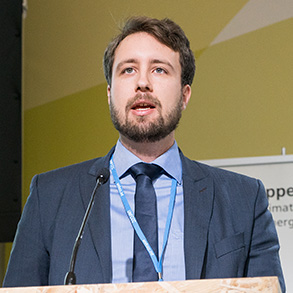 Lukas Hermwille, Wuppertal Institute for Climate, Environment and Energy, called for greater orchestration of non-state actor action.
Lukas Hermwille, Wuppertal Institute for Climate, Environment and Energy, called for greater orchestration of non-state actor action.
| 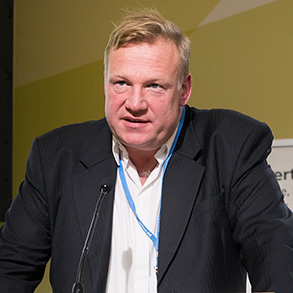 Sebastian Gallehr, European Business Council for Sustainable Energy, stated: “business can deliver if the legal framework is set ambitiously.”
Sebastian Gallehr, European Business Council for Sustainable Energy, stated: “business can deliver if the legal framework is set ambitiously.”
|
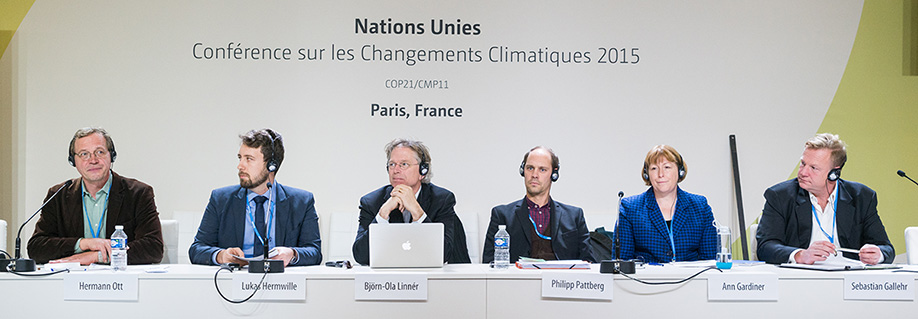 Panel (L-R):
Hermann Ott, Wuppertal Institute for Climate, Environment and Energy; Lukas Hermwille, Wuppertal Institute for Climate, Environment and Energy; Björn-Ola Linnér, Linköping University; Philipp Pattberg, VU University Amsterdam; Ann Gardiner, Ecofys; and Sebastian Gallehr, European Business Council for Sustainable Energy.
Panel (L-R):
Hermann Ott, Wuppertal Institute for Climate, Environment and Energy; Lukas Hermwille, Wuppertal Institute for Climate, Environment and Energy; Björn-Ola Linnér, Linköping University; Philipp Pattberg, VU University Amsterdam; Ann Gardiner, Ecofys; and Sebastian Gallehr, European Business Council for Sustainable Energy.
|
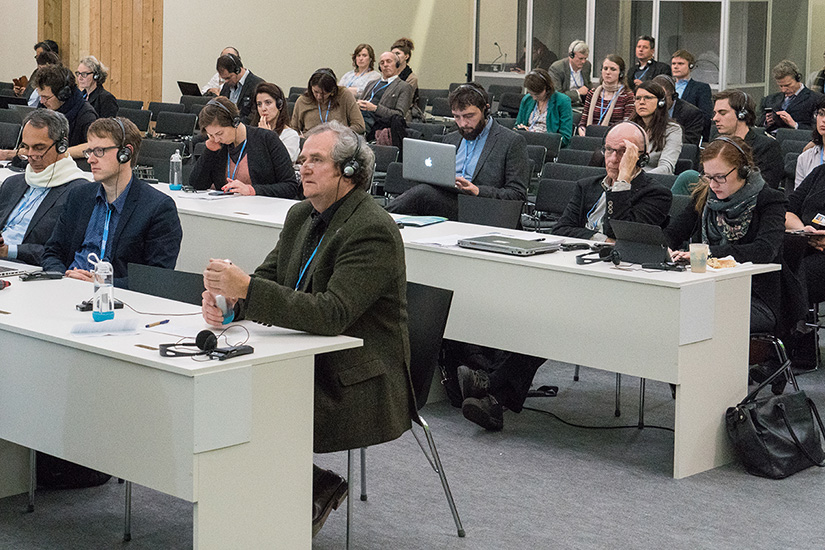
|
Scaling Up Small Island Developing States’ and Least Developed Countries’
Financial Capacity and Sustainability Presented by:
Governments of Palau, Tuvalu, Nauru, the Solomon Islands and Taiwan
Lamenting the practice of having to merge projects in order to access climate financing, Taukelina Finikaso, Minister of Foreign Affairs, Palau, underscored that Small Island Developing States (SIDS) are most vulnerable to climate change but do not have the capacity to access climate financing. He said implementing agencies “have their own agenda,” and this means, in terms of funding, that very little is left to “trickle down to adaptation projects.”
Stressing the need to invest in scientific research on climate change in order to better adapt, Kuo-Yen Wei, Minister of Environmental Protection Administration, Taiwan, noted climate change threats including sea-level rise, ocean acidification, biodiversity loss and an increase in the heat content of marine waters. He suggested that some climate finance be channeled into climate science and modelling, and announced a seed fund to help SIDS write proposals for climate finance.
Underlining the need for climate finance “now,” Koebel Sakuma, Palau, stressed that what SIDS want is not additional funds but access to “a fair share” of what is available. He noted that for partnerships to be effective, transparency is required on both sides. He also underscored the need for the Paris agreement to contain a 1.5°C target, noting that anything higher would jeopardize the existence of low-lying countries.
Calling for immediate, direct access to climate financing, Charmaine Scotty, Minister of Education, Nauru, stressed the importance of building the capacity of SIDS and developing countries to “understand the system” in order to benefit from it. Expressing hope that the Paris agreement will be “beneficial to all,” she suggested COP 21 adopt the slogan “do no harm to others and leave no one behind.”
Melchior Mataki, Permanent Secretary for Environment, Solomon Islands, emphasized the need to clearly define climate finance, noting that in some countries, official development assistance (ODA) is being equated with climate finance. He noted that climate finance funds are new funds, and additional to ODA. He called attention to the bureaucracy of accessing climate finance, stressing the immediate need for financing as “the waves won’t wait for finance.” He supported calls for investing in region-specific climate science, noting that some of the Intergovernmental Panel on Climate Change reports contain information that is not relevant for practitioners on the ground.
In the discussion, some participants noted, inter alia: the need for technical capacity in SIDS to access climate finance; the need for fast track direct access funding in order to get accreditation for national implementing status; and the Commonwealth climate finance skills hub, which builds capacity of those seeking to access climate finance.
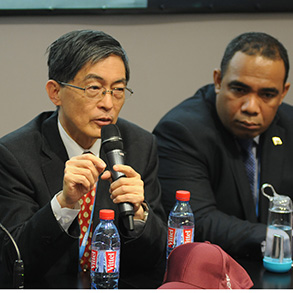 Kuo-Yen Wei, Minister of Environmental Protection Administration, Taiwan
Kuo-Yen Wei, Minister of Environmental Protection Administration, Taiwan
| 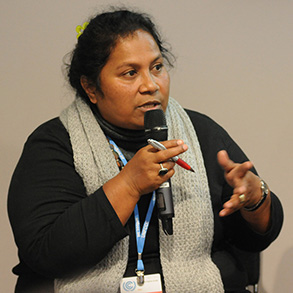 Charmaine Scotty, Minister of Education, Nauru
Charmaine Scotty, Minister of Education, Nauru
| 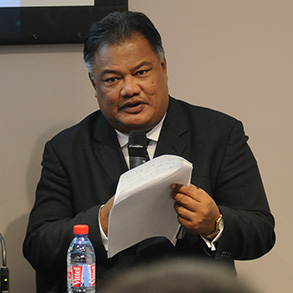 Taukelina Finikaso, Minister of Foreign Affairs, Palau
Taukelina Finikaso, Minister of Foreign Affairs, Palau
|
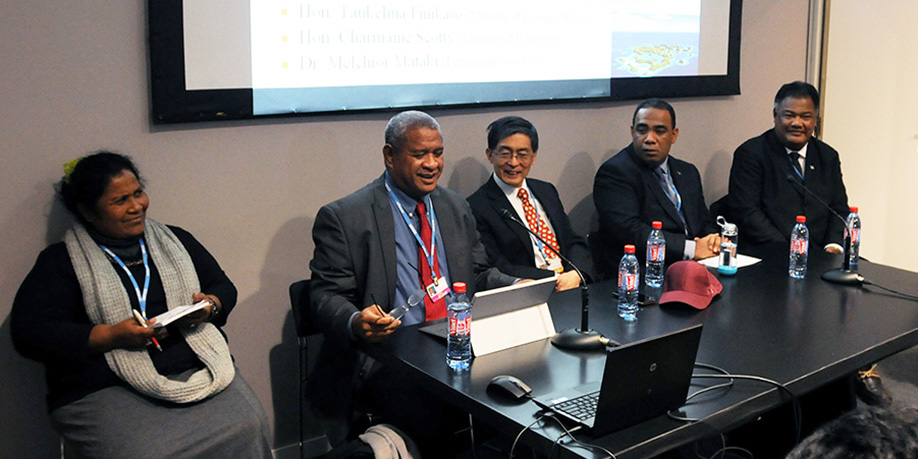 Panel (L-R):
Charmaine Scotty, Minister of Education, Nauru; Koebel Vitareli Sakuma, Palau; Kuo-Yen Wei, Minister of Environmental Protection Administration, Taiwan; Melchior Mataki, Permanent Secretary, Solomon Islands; and Taukelina Finikaso, Minister of Foreign Affairs, Palau.
Panel (L-R):
Charmaine Scotty, Minister of Education, Nauru; Koebel Vitareli Sakuma, Palau; Kuo-Yen Wei, Minister of Environmental Protection Administration, Taiwan; Melchior Mataki, Permanent Secretary, Solomon Islands; and Taukelina Finikaso, Minister of Foreign Affairs, Palau.
|
Contacts:
- Hank Liu (Coordinator) | hcliu@mofa.gov.tw
The Earth Negotiations Bulletin on the Side (ENBOTS) © <enb@iisd.org> is a special publication of the International Institute for Sustainable Development (IISD). This issue has been written by Lynn Finnegan, Tallash Kantai, Gillian Nelson, Ph.D., Annalisa Savaresi, Ph.D., and Asterios Tsioumanis, Ph.D. The Digital Editors are Naomi Devine and Brad Vincelette. The Editor is Dan Birchall <dan@iisd.org>. The Director of IISD Reporting Services is Langston James “Kimo” Goree VI <kimo@iisd.org>. The Sustaining Donors of the Bulletin are the European Union, the Government of Switzerland (the Swiss Federal Office for the Environment (FOEN), the Swiss Agency for Development and Cooperation (SDC)), and the Kingdom of Saudi Arabia. General Support for the Bulletin during 2015 is provided by the German Federal Ministry for the Environment, Nature Conservation, Building and Nuclear Safety (BMUB), the New Zealand Ministry of Foreign Affairs and Trade, SWAN International, the Finnish Ministry for Foreign Affairs, the Japanese Ministry of Environment (through the Institute for Global Environmental Strategies - IGES), the United Nations Environment Programme (UNEP), and the International Development Research Centre (IDRC). The opinions expressed in ENBOTS are those of the authors and do not necessarily reflect the views of IISD and funders. Excerpts from ENBOTS may be used in non-commercial publications only with appropriate academic citation. For permission to use this material in commercial publications, contact the Director of IISD Reporting Services at <kimo@iisd.org>. Electronic versions of issues of ENBOTS from the Paris Climate Change Conference - November 2015, can be found on the IISD Reporting Services website at http://enb.iisd.org/climate/cop21/enbots/. The ENBOTS Team at the Paris Climate Change Conference - November 2015, can be contacted by e-mail at <tallash@iisd.org>. |
||
|
IISD Reporting Services is grateful to the many donors of the Earth Negotiations Bulletin (ENB) and recognizes the following as core contributors to the ENB: the European Union, the Finnish Ministry for Foreign Affairs, the German Federal Ministry for the Environment, Nature Conservation, Building and Nuclear Safety (BMUB), the International Development Research Centre (IDRC), the Japanese Ministry of Environment (through the Institute for Global Environmental Strategies - IGES), the New Zealand Ministry of Foreign Affairs and Trade, the Kingdom of Saudi Arabia, SWAN International, Government of Switzerland (the Swiss Federal Office for the Environment (FOEN), the Swiss Agency for Development Cooperation (SDC), and the United Nations Environment Programme (UNEP). Funding for translation of the Bulletin into French is provided by the Government of France, the Wallonia, Québec, and the International Organization of La Francophonie/Institute for Sustainable Development of La Francophonie (IOF/IFDD). |
||